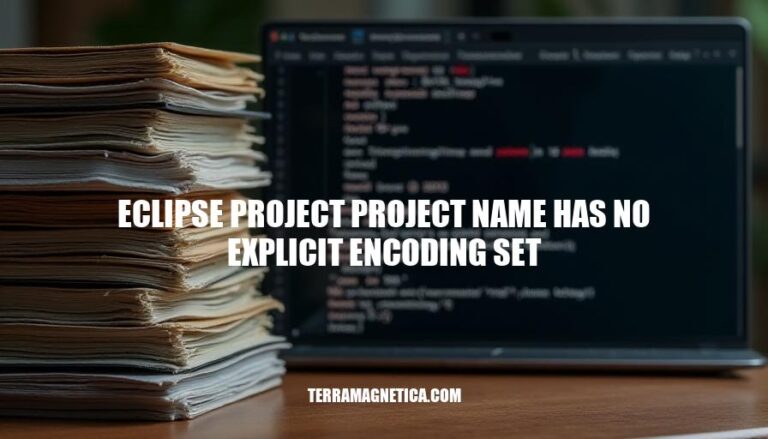


The warning “Project ‘project name’ has no explicit encoding set” in Eclipse IDE indicates that the project lacks a specified character encoding. This can lead to issues like character misinterpretation, especially with non-ASCII characters. It’s a common occurrence because Eclipse defaults to the workspace encoding, which might not be suitable for all projects. Setting an explicit encoding, such as UTF-8, ensures consistent handling of text files across different environments.
The warning “Eclipse project ‘project name’ has no explicit encoding set” indicates that the project does not have a specific character encoding defined. This can lead to several issues:
Default Encoding: Without an explicit encoding, the project will use the workspace’s default encoding, which is often system-dependent. This can vary between different environments and systems, leading to inconsistencies.
Character Encoding Issues: If the project contains files with characters outside the ASCII range (e.g., UTF-8 encoded files with special characters or non-Latin scripts), not setting an explicit encoding can result in characters being misinterpreted or corrupted when the project is opened on different systems.
Build and Runtime Errors: Inconsistent encoding can cause build failures or runtime errors, especially in internationalized applications where character encoding is crucial.
Collaboration Problems: When multiple developers work on the same project without a consistent encoding, it can lead to merge conflicts and other collaboration issues.
To resolve this, you should set the project’s encoding explicitly to a consistent value like UTF-8. This can be done in Eclipse by right-clicking the project, selecting Properties > Resource, and setting the Text file encoding to UTF-8.
The ‘Eclipse project project name has no explicit encoding set’ warning typically arises due to:
Setting the encoding explicitly in the project properties or workspace preferences can resolve this issue.
Sure, here’s a step-by-step guide to resolve the ‘Eclipse project project name has no explicit encoding set’ warning:
This should set the explicit encoding for your project and resolve the warning.
To avoid the “eclipse project project name has no explicit encoding set” warning in Eclipse, follow these best practices:
Set Encoding at Project Level:
Set Encoding at Workspace Level:
Use .settings Directory:
.settings directory in your project root.org.eclipse.core.resources.prefs with the following content:eclipse.preferences.version=1
encoding/<project>=UTF-8
Automate with Build Scripts:
eclipse {
project {
file {
withProperties { properties ->
properties['encoding/<project>'] = 'UTF-8'
}
}
}
}
Quick Fix:
Implementing these practices will help ensure consistent encoding settings across your projects and avoid the warning in the future.
To resolve this, set the project’s encoding explicitly to a consistent value like UTF-8 by right-clicking on the project, selecting Properties > Resource, and setting the Text file encoding to UTF-8. This can be done at both project and workspace levels, or through build scripts and automated processes.
Implementing these practices ensures consistent encoding settings across projects and avoids the warning in the future.